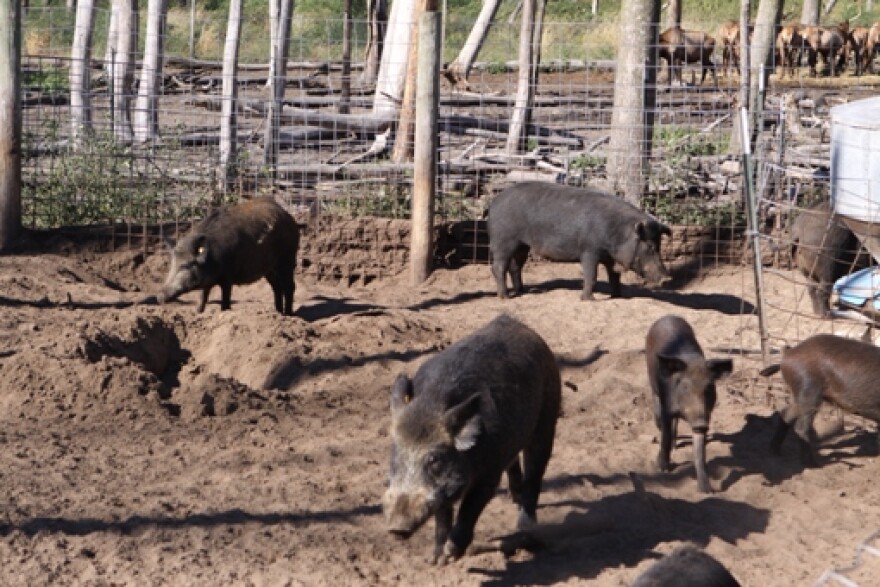http://ipraudio.interlochen.org/Pigs.mp3
State wildlife officials say there's a new invasive species in Michigan.
This one doesn't swim though, it walks.
Wild hogs are hunted on game ranches all over the state. But wildlife officials say the hogs sometimes escape and will permanently alter any landscape they make their home.
A cheap hunt
Wild is not the first word that comes to mind when you see Harvey Haney's pigs. Hunting ranches refer to these animals as Russian boars. They're brown and hairy and the males have small tusks.
"We even find women don't really care to shoot a pretty looking deer but they will shoot a hog because they're so ugly lookin'," Haney says.
Haney raises boars at his home north of Bay City for his hunting ranch an hour north. This winter he'll release them into 200 acres of woods surrounded by a ten-foot fence. Once on the loose in the woods, he says the pigs will become more wild and aggressive.
You can shoot one for $550 dollars. That's about the cheapest hunt available from Heritage Trophy Hunts. Deer and elk cost thousands of dollars.
Haney expects to turn away pig hunters this winter.
"It seems like there's a lot of hunters out there with $500 dollars to have a good time with all their friends. It's generally a group activity. You can have groups as big as ten guys at one time doing a pig hunt."
On the loose
Those guys would probably not find a Russian boar in the wild in Michigan. They were brought to North America from Europe and are common in the south. But state wildlife officials say there are now a few thousand on the loose in Michigan, mainly because they've been escaping from hunting ranches.
A report from the Department of Natural Resources and Environment almost 50 were shot last year.
"Pigs are essentially four-footed Asian carp," says Russ Mason, chief of the wildlife division at the DNRE. His staff recommends declaring wild pigs an invasive species. They tear up forests and farmland and destroy habitat for other animals.
Pigs are all but impossible to get rid of because they're smart and multiply quickly and have few predators.
"I've heard, by the way, guys say the coyotes will eat 'em," Mason says. "No, they won't. The pigs will eat the coyotes. Once they are established they are very durable predators and extremely aggressive."
It is possible to keep pigs fenced in, but Mason says you need something more than the standard 10-foot high game fence most ranches use.
"Maybe double fencing," he says. "Ten-foot high fence goes two feet into the ground, bevels in six feet to prevent digging, maybe anchored in concrete and a hotwire on top that will make bacon if you try to cross it, plus clearing vegetation for twenty yards on either side so nothing can knock it down. That's an expensive fence."
Pig Politics
At least 40 hunting ranches in Michigan sell boar hunts, and they have some support in Lansing. Michigan Farm Bureau came out in favor of allowing the existing ranches to operate as long there are some rules.
At the moment there are no regulations for wild pigs.
Earlier this month singer and gun rights advocate Ted Nugent was more outspoken about hogs. He told the Natural Resources Commission the state should encourage hunting, not squash it with new rules.
"Michigan should be a top one-or-two destination state in the nation for hunters and it's not even in the top thirty," he said.
Nugent owns a ranch near Jackson. He says a pig escaped once and was quickly rounded up.
"The hog hunting and high fence operations in this state are a win-win-win," he says. "And I challenge those who claim there are five-to-seven thousand pigs out there to show me one. I've got the boots let's go find it. They're not there," he says.
The director of the DNRE could declare wild pigs an invasive species at anytime. Then it would be illegal to have one anywhere, even on a private ranch. Michigan lawmakers wouldn't have to approve that decision.
But for now the department will meet with the industry to discuss other solutions. State officials say there are compromises, like requiring hunted pigs to be sterilized. But if wild pigs are regulated, the next question is who pays for inspections and enforcement.

